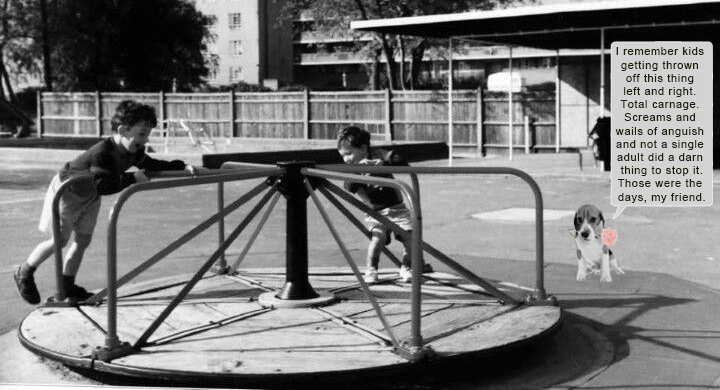
Battleground or Playground?
Jacques Cousteau, the man who made the world care about the ocean,
said, “A lot of people attack the sea. I make love to it.”
But he was French.
Not being French, I don’t see each day’s work as a choice between attacking or love-making. I see the future unfurl each morning as a fork in the road. Will I choose the battleground or the playground?
Do you see business as a necessity of life, a battleground swarming with vendors, employees, customers and competitors that have to be kept at bay? Or do you see each day as a playground where the principal game is called, “How can we make others happy?”
I have lived a strange life these past 40 years, spending all day, every day talking with business owners about their best and worst experiences in business.
What I have noticed is that there are patterns, one of which is that the “business is a playground” people are happier and more successful.
They didn’t become happy because they were successful. They became successful because they were happy, and wanted to make other people happy, too.
1. Who are you making happy?
2. How are you doing it?
3. Where do you find your inspiration?
Inspiration is an interesting subject. Decades of searching for it have taught me an immutable truth: “Take your inspiration from wherever you find it, no matter how ridiculous.”
My hero Robert Frost found inspiration in ridiculous places as well.
The way a crow
Shook down on me
The dust of snow
From a hemlock tree
Has given my heart
A change of mood
And saved some part
Of a day I had rued.
Here are three ridiculous places where I have found inspiration:
- J. Peterman catalogue
- Chuck Lorre Vanity Cards
- Chipotle Story Cups
J. Peterman catalogue
It’s Friday night at a 200-year-old pub off O’Connell Street in Dublin. World headquarters for conversation. Dark mahogany walls. Lean-faced men. Ruddy-faced women. The bursts of laughter aren’t polite, but real, approaching the edge of uncontrol. The stories being told are new, freshly minted, just for you. There is no higher honor. The room roar is high (but still, not as bad as in New York restaurants where you can’t make out what it is you, yourself just said). These Irishmen, in collarless Irish shirts and tweed caps, have managed to keep their mouths shut all week, saving up the good stuff for now, for Friday night, this very place, this very moment… How could one single city possibly give birth to Yeats, Shaw, Joyce, Wilde, Beckett… and all those here tonight as well? Working-Class Irish Pub Shirt, well-suited for both the intoxication of talk and the difficult art of listening. Not bad for just hanging out, either. Or, when absolutely necessary, for looking interesting. Simple collar band. Seven-button placket. Stud at neck. No-nonsense, rounded shirttails. Two-button cuff. No pocket. You have to carry everything you’ve got in your head.
Chuck Lorre Vanity Cards
# 397 CENSORED BY ME (by myself) I’ve decided to save everybody a lot of unhappiness and not submit this week’s vanity card to the CBS censors (I know when I’ve crossed the line with these things and don’t need a bunch of corporate lawyers getting their cotton blend panties in a bunch). Accordingly, I’ve banished the offending card to that dark place where all my offending cards go – the internet. View the censored 397.
#634 Russia, if you’re reading this, hack into the Nielsen computers and make our ratings higher.
Chipotle Story Cups
In 2014, Chipotle asked a number of America’s best writers to craft stories to print on the sides of their cups. This is the story written by bestselling author Barbara Kingsolver:
“Two-Minute Cheer for the Home Team”
The ancient human social construct that once was common in this land was called community. We lived among our villagers, depending on them for what we needed. If we had a problem, we did not discuss it over the phone with someone in Mumbai. We went to a neighbor. We acquired food from farmers. We listened to music in groups, in churches or on front porches. We danced. We participated. Even when there was no money in it. Community is our native state. You play hardest for a hometown crowd. You become your best self. You know joy. This is not a guess, there is evidence. The scholars who study social well-being can put it on charts and graphs. In the last 30 years our material wealth has increased in this country, but our self-described happiness has steadily declined. Elsewhere, the people who consider themselves very happy are not in the very poorest nations, as you might guess, nor in the very richest. The winners are Mexico, Ireland, Puerto Rico, the kinds of places we identify with extended family, noisy villages, a lot of dancing. The happiest people are the ones with the most community.
But here’s my favorite part of the Chipotle story:
“The Yale Collection of American Literature collects American Literature in all its formats and in all media, documenting the ways great American writers reach diverse and unusual audiences beyond standard book publishing,” says a statement from the world-famous library at Yale.
You guessed it. Yale acquired the whole series of Chipotle cups for the Yale University Library.
Evidently, I’m not the only one who finds inspiration in ridiculous things.
Roy H. Williams